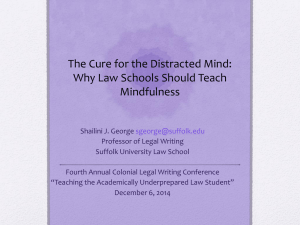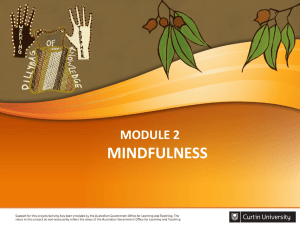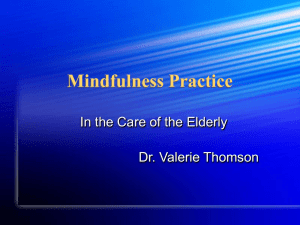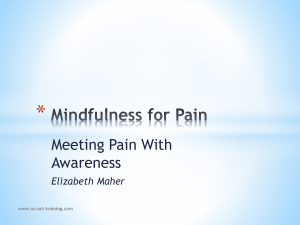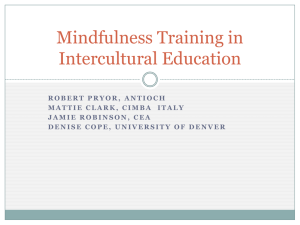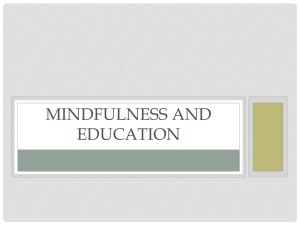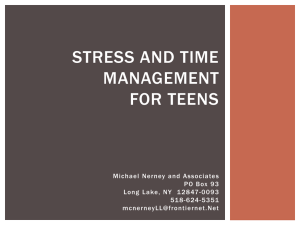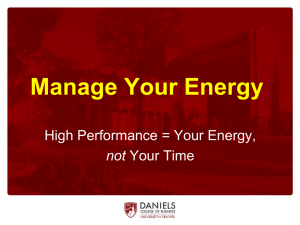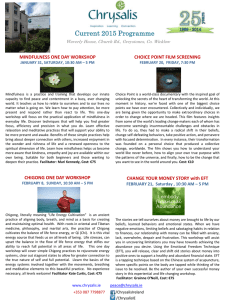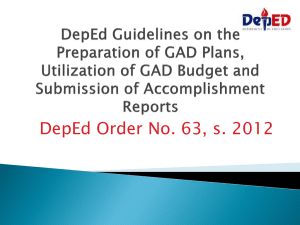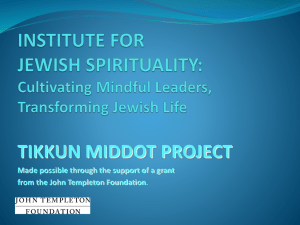Presentation Materials (PPTX File)
advertisement
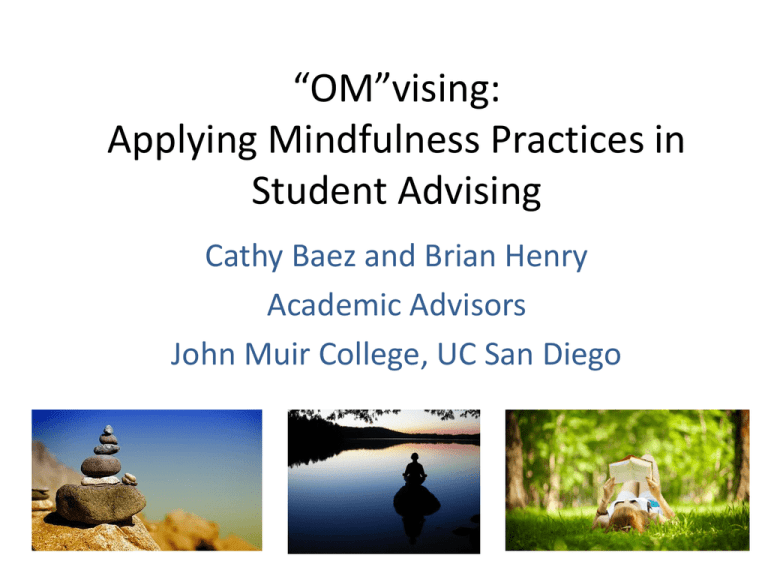
“OM”vising: Applying Mindfulness Practices in Student Advising Cathy Baez and Brian Henry Academic Advisors John Muir College, UC San Diego Mindfulness Practices in Student Advising and ‘SELF CARE’ Mindfulness: Being in the moment! “There are 7 elements of the mindfulness attitude that are required for someone to achieve the mindful state.” William Meek Let’s take a moment.. • To Breathe Mindfulness Attitude 1. 2. 3. 4. 5. 6. 7. Non-Judging Patience Beginner’s Mind Trust Non-Striving Acceptance Non-Attachment http://gad.about.com/od/selfhelp/a/mindfulness.htm Mindfulness Attitude • Non-Judging - Simply observing what is happening and not making a positive or negative evaluation. • Patience - Things must develop in their own time. ‘Immediate gratification’ http://www.psychologytoday.com/blog/recovery-life/201001/generationimmediate-gratification • Beginner’s Mind – Willingness to observe the world as if it was your first time! ‘Break the workplace monotony’ http://www.timeswellness.com/article/2/2009120220091201150906178c36922f6 Mindfulness Attitude • Trust – Having trust in yourself, your intuition, and your abilities. “Trust yourself. What makes it hard and how you can get better at it.” http://www.psychologytoday.com/blog/thecouch/201010/trust-yourself-what-makes-it-hard-and-how-you-can-get-better-it • Non-Striving – not doing anything, just accepting that things are happening in the moment. QUOTE: ‘It’s hard to understand in the moment why things are happening…” “Insights on the ‘Aha’ Moment” http://psychcentral.com/news/2011/04/01/insights-on-the-aha-moment/24906.html • Acceptance – Completely accepting the thoughts, feelings, sensations, and beliefs that you have and understanding that they are simply those things only. • Non-Attachment – Let a thought or feeling come in and pass without connecting it to anything, observing them exactly as they are. “Letting go of attachment, from A to Zen” http://zenhabits.net/zen-attachment/ Compassion How can I get to Mindfulness or ‘self care’ in the office? Relax: Quick break 10 or 60 seconds • Take 10 seconds to enjoy your drink (coffee, tea, water) • Take 60 seconds to focus on your breathing at your desk Relax: During Lunch Indoors or Out! • Take 15 minutes to eat – focus on eating without the phone, computer, etc • Take 15 minutes to disconnect from work , home, social media, etc. *Quiet time or find relaxing music and focus on your breathing. • Take 20 minutes to walk and focus on your breathing. Reframing Behaviors and Thoughts Cognitive Reframing in Advising • Get students to acknowledge their counterproductive habits. • Move past previous failures to acknowledge current successes. • Reinforce more productive habits. • Remind them that academics is a practice. Tips to Reconnect with Nature… SHARE WITH STUDENTS! http://blogs.psychcentral.com/dbt/category/mindfulness 1. Take a stay-cation: Block off time to be outdoors in your backyard, around the neighborhood, take hikes, walks, etc. 2. Open the Windows: open house window or just crack the window on your drive into work! 3. Stop and Listen: Sounds of nature, turn off TV and disconnect from other media. 4. Breathe: While outside focus on breathing in fresh air. 5. Be aimless: Go outside without a purpose. In other words “enjoy the moment!” 6. Bring Nature Indoors: Brighten up a space with natural elements like plants. 7. Walk: Replace activities (such as evening TV) with a 20 minute walk. 8. Eat fresh foods: Eat seasonal fruits and vegetables and use them as snacks! Resources Find your“happy place”and you will pass that calm energy to students! References Babauta, Leo. "Zenhabits." Letting Go of Attachment, from A to Zen. 10 May 2010. Web. 31 May 2012. <http://zenhabits.net/zen-attachment/>. Barth, Diane. "Off the Couch." Trust Yourself. What Makes It Hard and How You Can Get Better at It. 30 Oct. 2010. Web. 31 May 2012. <http://www.psychologytoday.com/blog/thecouch/201010/trust-yourself-what-makes-it-hard-and-how-you-can-get-better-it>. Boyce, Barry Campbell. The Mindfulness Revolution: Leading Psychologists, Scientists, Artists, and Meditation Teachers on the Power of Mindfulness in Daily Life. Boston: Shambhala, 2011. Print. "Carve a New Trail." Yoga Journal Feb. 2012: 92. Print. Kakar, Kapil. "Break the Workplace Monotony." Times Wellness. 02 Dec. 2009. Web. 31 May 2012. <http://www.timeswellness.com/article/2/2009120220091201150906178c36922f6>. References Continued Meek, William. "Mindfulness and GAD." About.com Generalized Anxiety. 27 Oct. 2008. Web. 31 May 2012. <http://gad.about.com/od/selfhelp/a/mindfulness.htm>. Nauret, Rick. "Insights on the € ˜Aha€ ™Moment | Psych Central News." Psych Central.com. 1 Apr. 2011. Web. 31 May 2012. <http://psychcentral.com/news/2011/04/01/insights-on-the-ahamoment/24906.html>. Santorelli, Saki. Heal Thy Self: Lessons on Mindfulness in Medicine. New York: Bell Tower, 1999. Print. Stratyner, Harris. "Recovery For Life." A Generation of Immediate Gratification. 12 Jan. 2010. Web. 31 May 2012. <http://www.psychologytoday.com/blog/recoverylife/201001/generation-immediate-gratification>.
